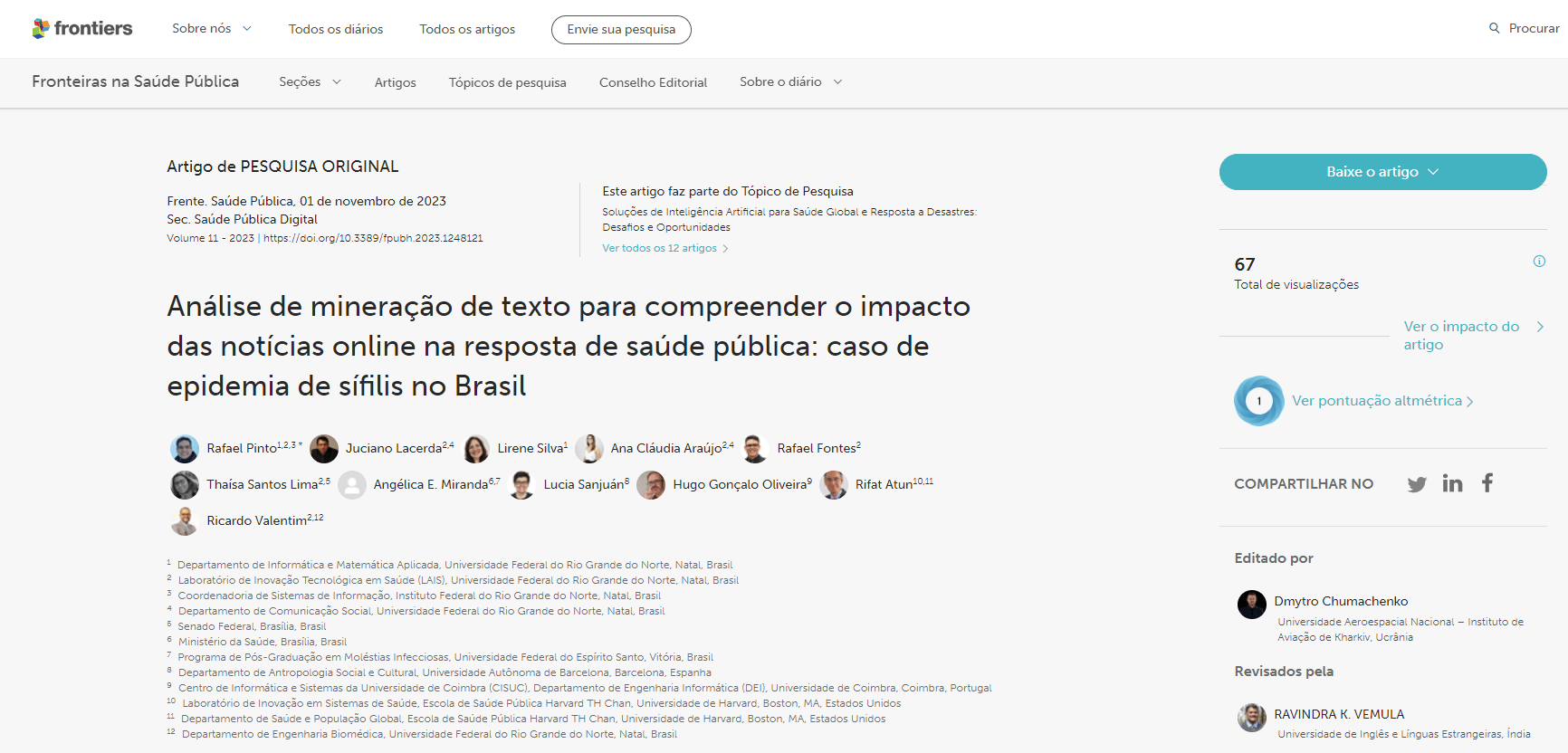Written by Valeria Credidio – Communications Consulting at LAIS/UFRN (ASCOM/LAIS)
In a four-year period, between 2015 and 2019, there was a significant increase in the number of articles published on syphilis as a major topic in Brazil. The result of this increase in the dissemination of quality information has been an increase in the number of STD tests across the country, allowing tested patients to be treated and recovered.
This association between news quality and syphilis testing performed in primary health care was the main finding obtained in research conducted by the Laboratory for Technological Innovation in Health (LAIS/UFRN) and described in the article “Text mining analysis to analyze” Understanding the impact Online News on Public Health Response: The Case of the Syphilis Epidemic in Brazil,” published in Frontiers in Public Health, one of the major scientific journals of international importance in the field of public health.
The impact of information quality is evident in the numbers. According to a study conducted by researchers, during the four years analyzed, the growth was significant. In 2015, 15 articles were published online, the main topic of which was syphilis. In 2019, this amount reached 437 news items produced and published, an increase of about 3,000% compared to 2015. It is worth noting that in 2018, the “Syphilis No” project was launched, in partnership between the Ministry of Health, LAIS/UFRN and the World Health Organization. of the Pan American Association (PAHO), which promoted the issue in all media in Brazil.
During this same period, an increase of up to 82% was recorded in syphilis tests, as highlighted by one of the authors of the article, Rafael Pinto. “We found an association between news quality and syphilis tests performed in primary care, with an increase of 82.32%, 78.13% and 73.20%, respectively, in the three types of treponemal tests used to confirm infection.”
To achieve these results, automated online news collection and processing was put into practice through a special digital health ecosystem created for the study. Text data mining techniques have also been applied to online news to extract patterns from text categories. “The presence of these categories and their integration into the collected texts determines the quality of the news that is analyzed to classify it into high-quality, medium-quality and low-quality news,” Rafael Pinto explained.
With all the surveys and intersections of data and analysis, researchers are confident in confirming the degree to which good communication influences public policy development. For Josiano Lacerda, a communications researcher and one of the authors of the article, the work, along with other research conducted by LAIS, shows that implementing massive public health campaigns, when they have great success in a community, elicit a positive reaction in the community. The amount of news published on this topic. It is worth noting that the analysis of the press material used seven indicators developed by the researchers to evaluate news related to syphilis as criteria, but they can be applied to media coverage of any case. All indicators were validated with health managers.
The researcher also highlighted that the research showed that there was a huge increase in the dissemination of spontaneous news about syphilis during the campaign period that was implemented within the “No to Syphilis” project. At the same time, with the quality standards of materials established by the researchers, based on the journalistic texts produced by the LAIS communications team, it was observed that news production during this period had a very high quality index.
Another relationship observed during research regarding congenital syphilis is that online articles dealing with its consequences caused a positive increase in searches for the topic on the Internet. This aspect is strongly (statistically) linked to an increase in examinations in basic health units. “This shows how important public health communication campaigns are in inducing behavior change, especially when dealing with issues related to the potential consequences of health problems,” he said.
These results were only possible because all published research relied on the use of artificial intelligence techniques, such as natural language processing and computational regression models, which made it possible to cross and analyze data from distinct and heterogeneous sources, such as newspaper texts. and epidemiological data, both relating to congenital syphilis. “These scientific findings are very important, because they can help better target the communication campaigns of the Brazilian Ministry of Health,” said Ricardo Valentim, Executive Director of LAIS, who is also one of the authors of the research.
International cooperation
The published research is the result of important international activities and collaborations, which is why the article brings together authors from universities and institutions, such as Harvard University (USA), University of Coimbra (Portugal), Autonomous University of Barcelona (Spain), Ministry of Saúde do Brasil, and Federal University of Rio Grande do Norte. (Brazil) and the Federal Institute of Rio Grande do Norte (Brazil).
According to Valentim, this is interdisciplinary research that integrates scientists from different fields of knowledge, such as doctors, anthropologists, journalists, engineers and computer scientists. The Director of LAIS emphasized that this is an example of the importance of building a network funded with research resources, aiming to develop research in the field of public health.
“The scientific findings presented in this article also reinforce this aspect, as groups of scientists, through these international collaborations, of which Brazil has been a major party, contribute to assisting public health policy makers, in this specific case, in the field of communications,” he concluded. Ricardo Valentim.
How to cite
Pinto Rafael, Lacerda Gucciano, Silva Lerin, Araujo Ana Claudia, Fontes Rafael, Lima Cesa Santos, Miranda Angelica E, Sanjuan Lucía, Goncalo Oliveira Hugo, Aton Rifaat, Valentim Ricardo. Text mining analysis to understand the impact of online news on public health response: the case of the syphilis epidemic in Brazil. Frontiers in public health. Volume 11. 2023.
URL=https://www.frontiersin.org/articles/10.3389/fpubh.2023.1248121
Article link: https://www.frontiersin.org/articles/10.3389/fpubh.2023.1248121/full

“Writer. Analyst. Avid travel maven. Devoted twitter guru. Unapologetic pop culture expert. General zombie enthusiast.”

